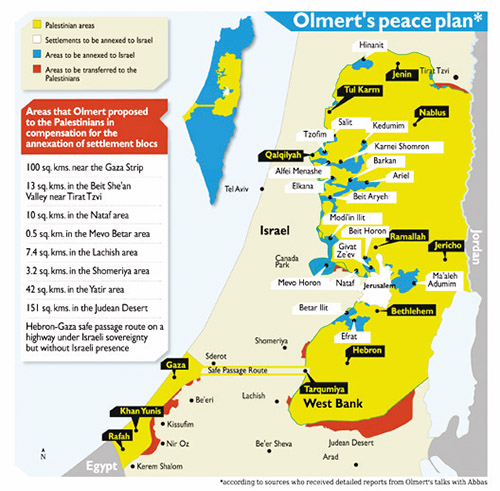
In the years since Israel’s rebirth in 1948 a narrative has taken root, a story of well-armed and financed Jewish immigrants overrunning peaceful Palestinian villages, brutally expelling Palestinians from home and country. This narrative is summed up in the Arabic word “nakba,” or catastrophe.
In contrast, Israelis view their War of Independence as a battle of the few against the many, a battle forced on a beleaguered Jewish community by Palestinian militias and five invading Arab armies.
If, as is believed almost uniformly throughout the Arab world, Israel was born in original sin, if the Jews really did ransack placid Palestinian villages, murdering children in front of parents and parents in front of children and expelling whoever was left, then Palestinian hatred for Israel and Jews would be understandable, as would their fundamental refusal to really make peace with Israel.
Though this Palestinian narrative is credulously accepted by many Europeans and an increasing number of “progressive” Americans, it is nonetheless false, and contradicts basic historical facts. Israel was not born in sin—with a few justified exceptions there were no expulsions, nor was there any policy of harming innocents. On the contrary.
Thus, even as early as 1937, Israel’s founding father, David Ben-Gurion, wrote in a letter to his son Amos: “We do not wish and do not need to expel Arabs and take their places. All our aspiration is built on the assumption—proven throughout all our activity … that there is enough room in the country for ourselves and the Arabs.”
Ten years later, despite much violence and conflict, Ben-Gurion’s core beliefs about living in peace with the Arabs had not wavered. In a speech on Dec. 13, 1947, he said: “In our state there will be non-Jews as well—and all of them will be equal citizens; equal in everything without exception … The attitude of the Jewish state to its Arab citizens will be an important factor—though not the only one—in building good neighborly relations with the Arab states.”
Despite the Jewish community’s attempts to live peacefully with their neighbors, the primary leader of the Palestinians, the grand mufti of Jerusalem, Haj Amin al-Husseini, chose to make common cause with the Nazis, declaring through his spokesman that the Arabs’ goal was “the elimination of the Jewish state.” (Larry Collins and Dominique Lapierre, “O Jerusalem,” 1st edition, p 400).
The mufti spent much of World War II in Nazi Germany, where he urged the accelerated extermination of the Jews in meetings with Hitler and Himmler, helped organize Bosnian Muslim SS units that committed grave war crimes against Serbian Christians and Jews and made numerous pro-Nazi propaganda broadcasts to the Arab world. For example, in a broadcast from Germany on March 1, 1944, Husseini urged Arabs everywhere to commit genocide against the Jews.
After the war Husseini was indicted by Yugoslavia for war crimes, but escaped prosecution by fleeing to Egypt, which gave him sanctuary.
The mufti’s actions directly implicated the Palestinian movement in the Holocaust, but the Jews still tried to reach an accommodation with their Arab neighbors. When the United Nations in 1947 passed a resolution to partition the Palestine Mandate (or what was left of it, since most of the original territory had been lopped off by Britain to create the entirely Arab state of Trans-Jordan) into a Jewish and an Arab state, the Jews supported the plan, despite being deeply disappointed with how little land they would receive. The five Arab states in the United Nations all denounced the resolution (UNGA 181), voted against it, and together with the Palestinian representatives vowed to go to war to kill it.
At the United Nations in May of 1948, just weeks prior to partition, Israel’s representative, Abba Eban, once again urged all parties to support the world body’s proposal and to avoid war. “Much suffering and grief can still be avoided by seeking the way back onto the highway of the partition resolution,” he said. (New York Times, May 2, 1948.)
Unfortunately for all involved, the Arabs ignored Eban and launched a brutal war against the Jews in which more than 1 % of the Jewish population was killed. Expecting an easy victory, the Arabs were surprised to meet stiff resistance, and when the Arab armies began to fall back from their initial victories (an Egyptian armored column had penetrated up the coast to within 21 miles of Tel Aviv), the Palestinians panicked and began to flee, thus creating the Palestinian refugee problem that endures to this day.
Were those Palestinian refugees expelled? It’s indicative that the largest group of Palestinian refugees, about 10 % of the total, who came from the mixed Arab-Jewish city of Haifa, were not expelled. On the contrary, as Benny Morris (a so-called revisionist historian much cited by Israel’s critics) documented, the Palestinians who fled Haifa did so against pleas from their Jewish neighbors and a British general that they stay put.
The Jewish mayor, Shabtai Levy, and the British commander, Major-General Hugh Stockwell, pleaded with the Arabs to reconsider … but the Arabs were unmoved.” (Morris, “1948 and After,” p. 20.)
A few days later, the Histadrut, the Israeli labor union, published its own appeal to the Arab residents of Haifa:
“Do not destroy your homes … and lose your sources of income and bring upon yourselves disaster by evacuation. The Haifa Workers Council and the Histadrut advise you for your own good to stay and return to your regular work.” (Morris, “The Birth of the Palestinian Refugee Problem Revisited,” 2004; p. 206.)
Had the Palestinians accepted partition, a Palestinian state would have been created side-by-side with Israel in 1948, and there wouldn’t have been a single Palestinian refugee. How then can Israel be blamed for the Palestinian refugee problem?
Tragic as this Palestinian refusal to accept statehood in 1948 was, it was no fluke. In accord with Abba Eban’s famous saying that the “Arabs never miss an opportunity to miss an opportunity,” Palestinians again refused statehood at least twice after 1948. In the summer of 2000, U.S. President Bill Clinton hosted intense peace talks at Camp David between Palestinian leader Yasser Arafat and Israeli leader Ehud Barak, culminating in a comprehensive peace plan known as the Clinton Parameters.
Despite the vast concessions the plan required of Israel, Barak accepted President Clinton’s proposal, while Arafat refused, returned home and launched a new terror campaign against Israeli civilians (the Second Intifada).
Despite the violence, Barak continued to negotiate to the end of his term, culminating in an Israeli proposal at Taba which extended the Clinton proposal. Barak offered the Palestinians all of Gaza and most of the West Bank, no Israeli control over the border with Jordan or the adjacent Jordan Valley, a small Israeli annexation around three settlement blocs balanced by an equivalent area of Israeli territory that would have been ceded to the Palestinians.
As chief U.S. negotiator Ambassador Dennis Ross put it in a Fox News interview: “The Palestinians would have in the West Bank an area that was contiguous. Those who say there were cantons, completely untrue. It was contiguous … And to connect Gaza with the West Bank, there would have been an elevated highway, an elevated railroad, to ensure that there would be not just safe passage for the Palestinians, but free passage. (Fox News, April 21, 2002)”
According to Ambassador Ross, Palestinian negotiators working for Arafat wanted him to accept the Clinton Parameters, but he refused. In response to Brit Hume’s question as to why Arafat turned these deals down, Ross said: “Because fundamentally I do not believe he can end the conflict. We had one critical clause in this agreement, and that clause was, this is the end of the conflict. Arafat’s whole life has been governed by struggle and a cause. Everything he has done as leader of the Palestinians is to always leave his options open, never close a door. He was being asked here, you’ve got to close the door. For him to end the conflict is to end himself.”
Despite the rejection of the Clinton plan, and the bloody Palestinian suicide-bombing campaign that ensued, Israel again tried to make peace with the Palestinians in 2008. After extensive talks, then Israeli Prime Minister Ehud Olmert met with Palestinian Authority President Mahmoud Abbas and presented a comprehensive peace plan, going beyond even the Clinton proposal. Olmert’s plan would have annexed the major Israeli settlements to Israel and in return given equivalent Israeli territory to the Palestinians, and would have divided Jerusalem.
Numerous settlements including Ofra, Elon Moreh, Beit El and Kiryat Arba would have been evacuated, and Hebron would have been abandoned. Tens of thousands of settlers would have been uprooted. Olmert even says preliminary agreement had been reached with Abbas on refugees and the Palestinian claim to a “right of return.”
Olmert recounted much of this in an interview with Greg Sheridan in the Australian newspaper: “From the end of 2006 until the end of 2008 I think I met with Abu Mazen [Abbas] more often than any Israeli leader has ever met any Arab leader. I met him more than 35 times. They were intense, serious negotiations. … On the 16th of September, 2008, I presented him [Abbas] with a comprehensive plan.”
[Olmert says he showed Abbas a map, which embodied all these plans. Abbas wanted to take the map away. Olmert agreed, so long as they both signed the map. It was, from Olmert’s point of view, a final offer, not a basis for future negotiation. But Abbas could not commit. Instead, he said he would come with experts the next day.]
“He [Abbas] promised me the next day his adviser would come. But the next day Saeb Erekat rang my adviser and said we forgot we are going to Amman today, let’s make it next week. I never saw him again.”
And this is not just a self-serving claim by Olmert—Abbas, in an interview with Jackson Diehl of The Washington Post, confirmed the outlines of the Olmert offer, and that he had turned it down: “In our meeting Wednesday, Abbas acknowledged that Olmert had shown him a map proposing a Palestinian state on 97 % of the West Bank—though he complained that the Israeli leader refused to give him a copy of the plan. He confirmed that Olmert ‘accepted the principle’ of the ‘right of return’ of Palestinian refugees—something no previous Israeli prime minister had done—and offered to resettle thousands in Israel. In all, Olmert’s peace offer was more generous to the Palestinians than either that of Bush or Bill Clinton; it’s almost impossible to imagine Obama, or any Israeli government, going further.
“Abbas turned it down. ‘The gaps were wide,’ he said.”
Ha’aretz published Olmert’s map, showing a Palestinian state on the West Bank and Gaza with a free-passage route to connect them. The map, which also showed the Israeli territory that would have been swapped with the Palestinians in return for annexing some Israeli settlements to Israel, is reproduced below:
In spite of the clear reality that the Palestinians have repeatedly run away from a negotiated peace and statehood, and have caused most of their own problems, it’s a testament to the power of endlessly repeated propaganda that so many in the West, including an increasing number of “progressive” Americans, act as if Israel caused the Palestinian refugee problem, as if Israel refuses to make peace, and as if Israel stands in the way of a Palestinian state.
The Palestinian nakba narrative is a potent myth, a massive collection of blatant falsehoods intended to stand history on its head and turn victim into perpetrator. Increasing Western acceptance of these falsehoods accomplishes nothing except to encourage the Palestinians to keep rejecting compromise and peace, guaranteeing more suffering and death, for the Israelis but especially for the Palestinians themselves.
Alex Safian is associate director of the Committee for Accuracy in Middle East Reporting in America (CAMERA).
*edited for space; see JNS.org for full article














